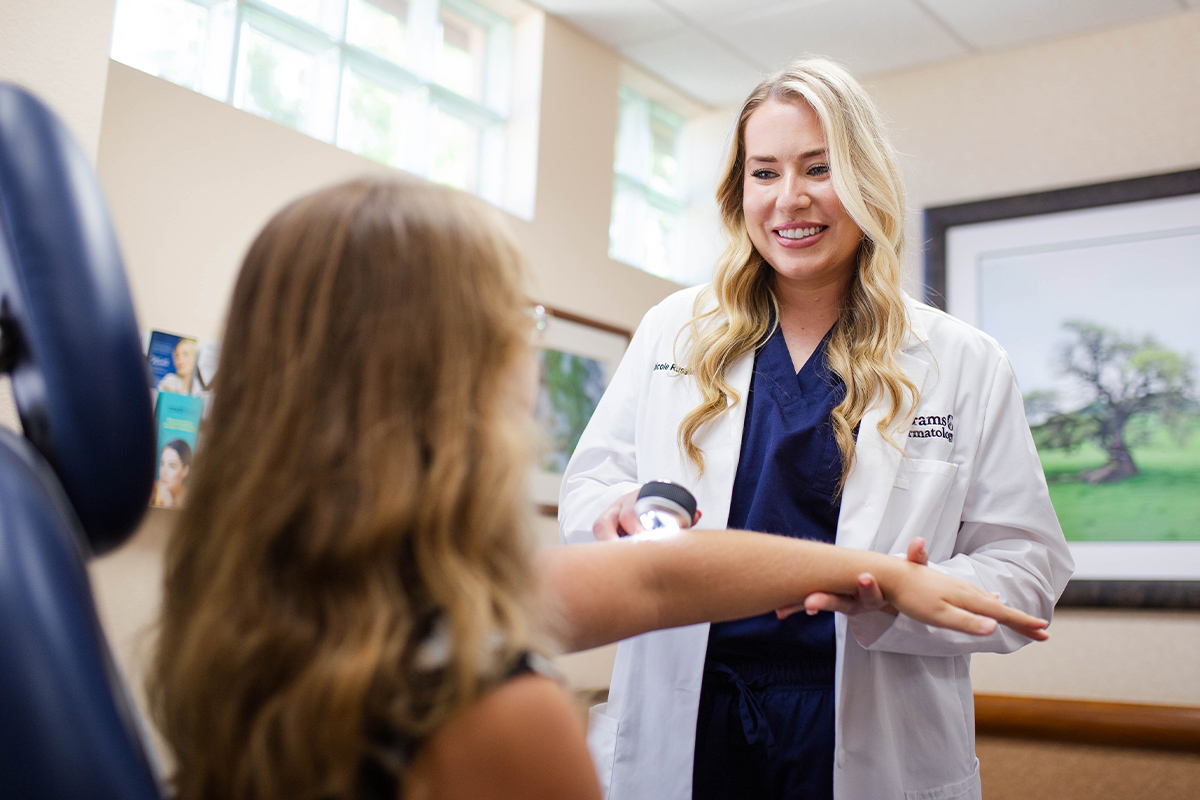Recognizing skin cancer early can save lives. Symptoms to watch for include changes in the size, shape, or color of moles, the appearance of new growths, sores that don’t heal, and itchy or painful spots on the skin. If you notice any of these signs, it’s essential to schedule an evaluation at Abrams Dermatology promptly and determine if skin cancer surgery in Sarasota is the right treatment plan for you.
Early Detection and Treatment Can Save Your Life
Skin cancer occurs when skin cells begin to grow uncontrollably, often due to damage from ultraviolet (UV) radiation from the sun or tanning beds. It typically manifests in three main types: basal cell carcinoma, squamous cell carcinoma, and melanoma, the most aggressive form. Skin cancer can spread to other parts of the body if left untreated. You must undergo regular skin examinations and be aware of any suspicious changes in your skin to identify and treat skin cancer at the earliest stage possible.

Possible Signs and Symptoms of Skin Cancer:
- Thickening or elevation of a previously flat mole
- Scaling, erosion, oozing, bleeding, or crusting on the skin’s surface
- Redness, swelling, or small new patches of color surrounding a larger lesion
- Itching, tingling, or burning sensations in the affected area
- Softening or friable areas that easily break off
- A firm, transparent bump with tiny red blood vessels (telangiectasias)
- A reddish or irritated patch of skin that doesn’t heal
- A new, smooth nodule with a raised border and an indented center
- A shiny, pearly bump that resembles a mole or cyst
- A shiny area of tight skin, especially on the face, with poorly defined edges
- An open sore that oozes, bleeds, or crusts and hasn’t healed in three weeks
- A persistent red bump on skin frequently exposed to the sun
- Changes in existing moles, including the development of new colors
What Are the Types of Skin Cancer?
Basal Cell Carcinoma (BCC)
Basal cell carcinoma is the most common type of skin cancer, originating in the basal cells of the epidermis. It typically appears as a small, shiny bump or a pinkish patch on sun-exposed areas of the skin, such as the face, neck, and ears. BCC grows slowly and rarely spreads to other parts of the body, making it highly treatable with skin cancer surgery in Sarasota when detected early. However, if left untreated, it can cause significant local damage.
Squamous Cell Carcinoma (SCC)
Squamous cell carcinoma (SCC) is the second most common skin cancer. It arises from the squamous cells found in the outer layer of the skin and often appears as a firm, red nodule or a scaly, crusted lesion. SCC commonly develops in areas frequently exposed to the sun, such as the face, ears, and hands. While it can metastasize if not treated, early detection and removal usually result in a favorable prognosis.
Melanoma
Melanoma is the most aggressive form of skin cancer, originating from melanocytes, the pigment-producing cells in the skin. It can develop from existing moles or appear as new dark spots. Melanoma is characterized by asymmetrical shapes, irregular borders, multiple colors, and a diameter larger than a pencil eraser. It has the potential to spread to other parts of the body, making early diagnosis and treatment crucial for improving survival rates.

Skin Cancer Treatments in Sarasota May Include…
Electrodesiccation and Curettage
Electrodesiccation and curettage (ED&C) is a two-step procedure commonly used to treat superficial skin cancers. First, the dermatologist scrapes away the cancerous tissue using a curette. Then, electrodesiccation is applied to destroy any remaining cancer cells by using heat generated from an electric current. This method offers a quick recovery with minimal scarring.
Surgical Excision
Surgical excision involves removing the cancerous skin along with a margin of healthy tissue to ensure complete removal of the cancer. This method is suitable for various types of skin cancer and is often performed under local anesthesia. The excised tissue is sent for pathological examination to confirm that all cancer cells have been removed.
Cryosurgery
Cryosurgery involves freezing the cancerous cells using liquid nitrogen. This method is typically used for superficial skin cancers and precancerous lesions. The extreme cold destroys the abnormal cells while minimizing damage to surrounding healthy tissue. Cryosurgery is a quick procedure that requires little to no downtime, making it a convenient option for many patients.
Mohs Surgery
Mohs surgery involves removing the cancerous tissue layer by layer and examining each layer microscopically for cancer cells. If cancer cells are detected, additional layers are removed until no cancerous cells remain. Mohs surgery allows for the complete removal of cancer while preserving as much healthy skin as possible, resulting in better cosmetic outcomes.
Topical Chemotherapy
Topical chemotherapy involves applying a chemical agent directly to the skin to treat superficial skin cancers. One commonly used medication is 5-fluorouracil, which works by inhibiting cancer cell growth. This treatment is effective for superficial basal cell carcinoma and actinic keratosis. This method offers a non-invasive option for localized skin cancers.
Radiation Therapy
Radiation therapy is generally used for patients who are not candidates for surgery or those with larger or more aggressive tumors. This treatment uses high-energy rays to target and kill cancer cells. Radiation therapy may be used alone or in conjunction with other treatments and is often recommended for skin cancers located in difficult-to-treat areas, such as the face or ears.
Skin Cancer FAQs
What Should I Do if I Notice a Suspicious Spot?
If you notice a new or changing spot on your skin, it’s essential to schedule an appointment with your dermatologist promptly. Early detection is crucial in successfully treating skin cancer.
How Often Should I Have a Skin Exam?
The frequency of skin exams varies based on your risk factors. If you have a history of skin cancer or numerous moles, your dermatologist may recommend annual or more frequent check-ups. For those at average risk, a yearly exam is typically sufficient.

Why Choose Us For Your Skin Cancer Surgery in Sarasota
Abrams Dermatology is dedicated to providing comprehensive skin care and cancer prevention through expert evaluations and treatments. Our team, led by Dr. Abrams, is committed to ensuring your skin health and addressing any concerns you may have. Whether you need a routine skin exam or have concerns about a suspicious spot, we encourage you to schedule your consultation. Remember, prompt diagnosis and treatment is essential!